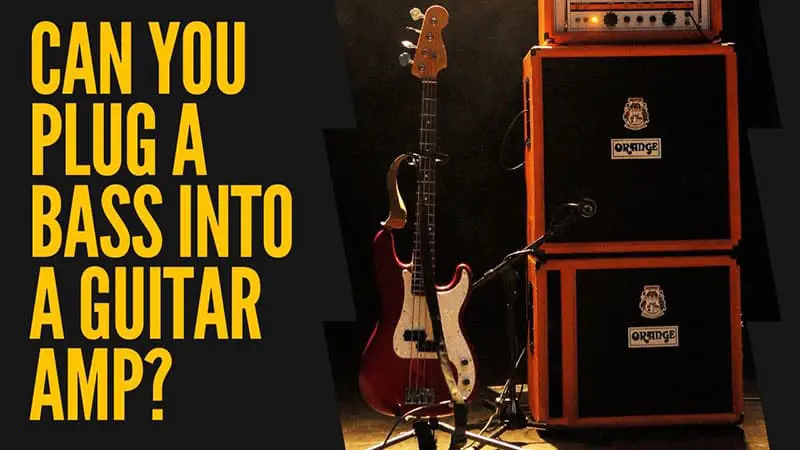So, your bassist bandmate comes to your house for jamming, without his bass amp. You, being the guitarist and having only a guitar amp, can you plug the bass into your guitar amp?
You can plug a bass into a guitar amp for home practice and jamming sessions. However, be careful about the volume level of your electric guitar amp. Due to its incompatibility with bass, loud and heavy playing would damage its components.
So, how much low volume is considered acceptable when you are band practicing? Well, there is a lot more than meets the eye. Rather than just scratching the surface, keep on reading till the end to get some valuable insights on bass guitar, bass amps as well as guitar amps.
Differences Between Bass and Guitar Amps
It is always an advantage to know in-depth about the differences among the musical instruments, in our case, guitar amp and bass amp so that you can use them according to the configuration of your preference.
Here, we would be using a generic solid-state amp as a reference and give you a brief overview of tube amps later. Check out these important differences between these amps.
| Bass Amp | Electric Guitar Amp | |
| Size of the speaker | These types of amps have robust, comparatively larger speakers that robust. | Guitar amplifiers have smaller-sized speakers, comparatively less robust. |
| Wattage rating | Higher wattage rating for stronger power output ranging from 150 to 500 watts. | Comparatively lower wattage rating than a bass amp, typically ranges around 20-100 watts. |
| Frequency | Focused on low-end frequencies. | The range of frequency is mid-focused. |
| Access to controls | Limited control knobs are available, such as volume and EQ knobs only. | Other than Volume and EQ knobs, effect knobs might be available. |
| Ease of controlling the sound | It is a bit tricky to elicit the perfect sound through a bass amp due to its subtle configurations. | The configuration is pretty straight-forward |
You can also find some apparent differences such as the caging of a bass amp is more spaciously perforated than the regular guitar amp. This is done to convey smooth bass tones.
A greater power supply of the bass amps is required to revamp the low-end bass frequencies significantly to make them audible. The guitar amp tone which is mid-ranged consumes less power.
From practical experience, I can certify the trickiness of the sound control of a bass amp. You need to adjust the volume knob or the gain very carefully, otherwise, you might damage the guitar speaker or blow up the fuse.
The commonalities between these two types of amplifiers can be deceiving. They are often the reasons for the rookie mistakes like plugging in the bass guitar into a solid-state guitar amp without giving any second thoughts.
The most common features of these two musical gears are the instrument cable port and the similar-looking EQ controls. Some of the amps (guitar or bass) have an audio input port or a headphone socket which might be a life-saver in such a case like you are facing.
How to Play a Bass Using a Guitar Amp Safely
So, now is the moment of truth. You being a guitar player, might only have a guitar amplifier. If that’s a practice amp you might fancy experiencing the musical hums of bass once in a while. So, here are some tricks you can follow to play the bass guitar through your guitar amp without ruining it.
Play it at a Low Volume
How do you rock out bass at a low volume? Well, you have to compromise such a passion in such a case because one: higher volume would risk your guitar speaker due to mismatched impedance. And two: the sound would be distorted to a point where it would appear crackling and broken.
But the good news is, there is a certain level of threshold volume within which you can play the bass safely. And that volume is sufficient, especially if you are playing a passive-pickup bass guitar in your room or college dorm.
For bass with active pickups, the threshold is a bit lower, but that too doesn’t produce bad sound. So, turn your master volume control of both bass knob and amp knob down enough so that the amp doesn’t provide intermittent burst feedback (Random burst noises).
Use Headphones
This way, you can practice the bass as loud as you want as the amplifier’s speaker won’t have to emit the high-power output sound. The only problem you might have is when you don’t have a headphone, or a headphone without a converter to connect into the cable port.
Use Compressor Pedals
Using a compressor pedal is another option because, usually, most electric guitar players might have multiple guitar pedals or processors ready at their disposal. So, using the compressor pedal would do its work fine for bass and put less pressure on a guitar amp.
But of course, due to the compression, the output bass tone would be somewhat compromised. Even so, that’s better than nothing.
Play Gently
With a bass guitar, you can go nuts with the heavy bass playing techniques that are used in heavy-metal, even non-metal, or punk songs. Slapping is such a technique that sends a surge of an input signal into the amp.
Such a surge in electrical signal might not be harmful once in a while. But constant slapping on the thick bass strings would harm the amp.
So, even if you are a metalhead like me, it is better to play simple bass lines of a song. You can head to funk master-type playing once you have a real bass amp.
Play in the Clean Channel
Some practice amps might have a clean channel as well as a distortion channel. If your amp has that, always choose the clean channel when you plug in the bass guitar or an acoustic guitar for that matters.
Pros and Cons
A solid-state amp built for guitar can provide you some unique advantages if you play bass in it. After all, every cloud has a silver lining. Let’s see what the advantages we might be expecting.
Pros
- First of all, you don’t need to pay extra bucks to get a bass amplifier.
- The guitar amp speakers will produce a slightly distorted sound unlike the smooth and clean sound created by a bass amp. However, you can use it to your advantage if you love rock and heavy metal. You can practice it at home, sounding like one of the most accomplished bass players ever – Lemmy Kilmister from Motorhead. some modern artists also use such a tone.
- You can tweak the knobs on the solid-state amps as there are more options for tone control.
Now, let’s see what aspects might bother your bedroom bass practice using a solid-state guitar amplifier.
Cons
- The same distorted and rattling sound we talked about earlier, could be irritating if the rattling is too much. Sometimes, string squeak might be a bonus.
- Playing at a low volume is not that fun. Band practice might be not as effective and obviously, not suited for gig performances.
- Not being able to use advanced techniques or heavy picking (although fingerstyle playing is encouraged for playing bass).
Expert Opinion
Now, if you ask me, I’d say you can go for it if you are tight on budget to afford a bass amp or you just want to experiment or just once in a while. Bear in mind that, you wouldn’t have the rich sound of a real bass; just a decent sound to practice with.
Also, if your guitar amp is really expensive, then I wouldn’t suggest playing bass in it. Of course, it wouldn’t be the end of the world if do that, but it’s just my personal preference.
But if you don’t have budget problems and you are passionate enough to become an expert in both guitar and bass, I would highly recommend buying a dedicated bass amp. There are some really cheap options, and they are worth the price and experience.
Not necessarily you’d have to buy a bass amp that is in mint condition from the guitar center. You can find some near-perfect conditioned bass amps in a pawn shop. It would be a good idea to take an expert to the pawnshop when you go.
FAQs
Can I Play Bass in a Tube Amp?
It is a big no to plug a bass in a guitar tube amp. First of all, tube amps are expensive and fragile. Secondly, unlike the solid-state amps, tube amps won’t sustain the power surge caused by the bass guitar. As a result, it would be easily damaged, sometimes beyond repair.
Can You Play Electric Guitar in a Bass Amp?
In short, you can. However, that also comes with some pros and cons that would not provide a clean tone as a guitar amp. Obviously, gear matters significantly in such cases and you might get different results according to the gears you have. However, for optimum results, use the necessary gears where they fit the best.
Final Words
I hope that you have more than enough idea on how to play bass in your guitar amp without frying its internal components. Use this knowledge well, keep on practicing and rock hard!!!


